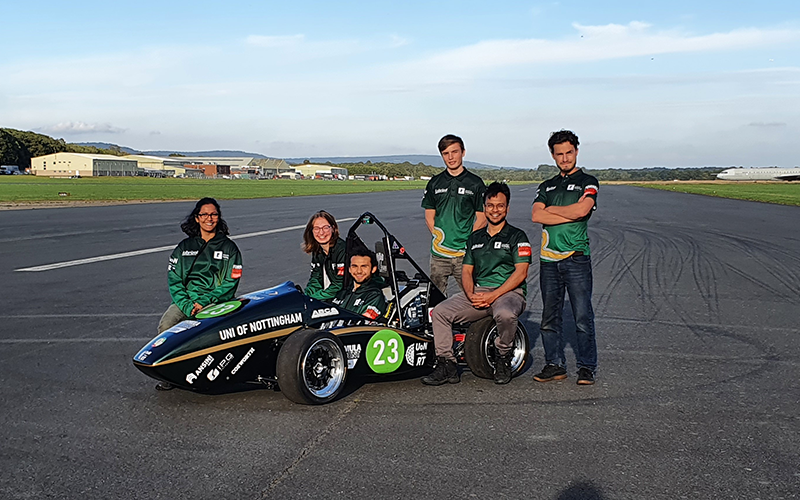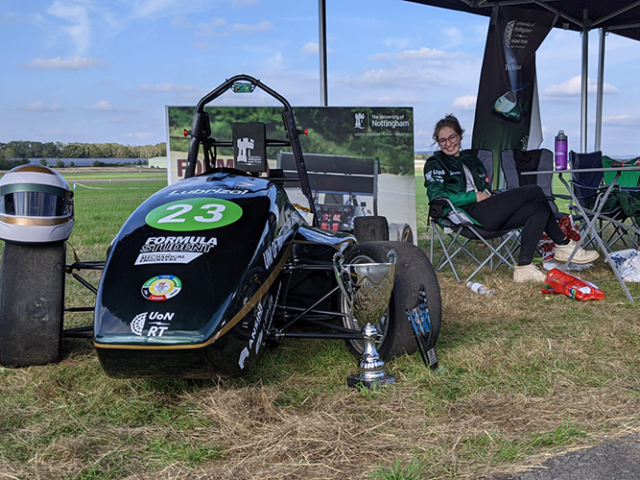Passionate about STEM innovation and widening effective communication of technical topics makes Shreeja Basak’s role as Public Relations Lead for the Nottingham Racing Team a perfect fit. Alongside this exciting role, Shreeja is a PhD student at the University of Nottingham, researching how to make additive manufacturing processes less wasteful and more cost efficient.
Shreeja has always had an interest in product design as she has been intrigued by how things are made and how they work for as long as she can remember. Engineering was the ideal choice as it combined Shreeja’s passion for creativity, involved in design, and analytical problem solving from maths and science. “I think engineering just stood out to me when I was choosing my GCSE subjects. I don’t think there is any one moment but my time at school sort of progressed towards me taking an interest in engineering,” she exclaimed.
With her dad being a scientist, Shreeja was always surrounded by a fundamental part of STEM: “He’s inspired me a lot with regards to maths and science.”
“I didn’t know anyone who was an engineer growing up, but I’ve always had the support of my parents to just go for it and try whatever subjects I enjoy. A combination of my parents support and enjoying design and technology, taught in schools, are my two sources of inspiration,” Shreeja continued.
Achievements and key milestones
Shreeja explained her key milestones in her career so far, the first being completing her undergraduate degree and graduating from the University of Cambridge.
The second milestone was being part of the Solar Car project, alongside the University of Nottingham’s Racing team. Shreeja recalled two amazing aspects to being part of the project. The first being part of a team, building an electric car powered by the sun: “That is an amazing achievement. Students who are part of the team may feel like they play a small role, but it all comes together to an amazing product.”
Shreeja said she was lucky enough to have personal experience with the adventure side that comes with the competition as she was part of the Solar Car project at the University of Cambridge. “It’s sort of a testament to the incredible young people involved in such projects and its fantastic that we have the Solar Car project at Nottingham, and the chance to give young people those skills.”
Encouraging women into STEM subjects
The responsibility of inspiring more women into STEM subjects is the responsibility of everyone, not just the education system.
Shreeja believes there is much more collectively that can be done to spread the image to a wider audience, that not just women, but people from diverse backgrounds, sexualities, ethnicities, and races can collaborate and contribute to engineering. Bringing their own perspective and coming up with innovative solutions together.
“I think a lot of support comes from closer to home. If we can inspire parents, family, friends, everyone to just be supportive and receptive, and open to the idea of all sorts of people in STEM, I think that will boost diversity.”
Schools and universities can always do more. Schools could better encourage young women and girls to stick with STEM subjects: “I have come across initiatives where school groups plan experiments and projects that tap into what younger girls are interest in. as soon as they realise something is interesting to them, it allows them to be super creative and make something that speaks to them. It’s a fantastic way of doing it.”
At university level, women have generally set their path in motion by choosing to study a STEM subject. Shreeja explained: Universities can do more to present a diverse image of who can study what subjects.”
Five years in the future
In the next five years, Shreeja hopes to pursue her passion for innovation management. Aside from bridging the technical and non-technical boundary, she has a strong interest in how to get ideas from a research phase to a wider audience. “I see myself really working to help people come up with a business plan to bring their ideas to fruition, helping spin out companies from university and researchers bring their ideas out from their research lab into wider public domain,” she said.
Within the industry, Shreeja cannot recall a specific moment where she has faced prejudice due to her gender: “People are generally very welcoming and prejudice free.
“There are other barriers that stop women going for leadership roles in STEM, but I think STEM as a community is generally anti-discrimination. But it can always improve,” Shreeja continued.
Nevertheless, Shreeja concluded: “I’m so glad I do engineer because even though its tough at times, it’s for me.”





